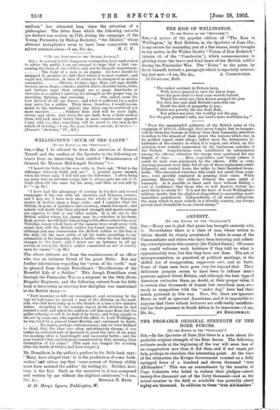WELLINGTON'S " SCUM OF THE EARTH."
[To THE EDITOR OF THE "SPECTATOR."] Sra,—May I be allowed to draw the attention of General Tyrrell and the readers of the Spectator to the following ex- tracts from an interesting book entitled " Reminiscences of General Sir Thomas Makdougall Brisbane" ?- " I heard the Duke at his own table in Paris ask, 'What is the difference between Soult and me ?' A general pause ensued, when his Grace said, will tell you the difference. I often bring nay army into an infernal scrape, but it always gets me out of it. Soult often did the same for his army, and then he was left by it.'"—(p. 30.) "I have had the advantage of serving in the first and second campaigns of the war with the Austrian and Prussian armies; and I may say I, have seen almost the whole of the European armies in motion upon a large scale ; and I consider that. the British, in point of quickness and accuracy, stands foremost; and nobody will doubt that their physical strength and moral courage are superior to that of any other nation. It is all one to the British soldier where his enemy may be,—whether in his front, flank, or' rear; he will fight him as long as his officer orders him, as at Waterloo, where whole faces of the squares were swept away with round shot, still the British soldier was found immovable. And although you may characterise the British soldier as the lion in the field, yet the most noble of all his traits, according to, my estimation, is his humanity after a battle, when the lion suddenly changes to the lamb; and I never saw an instance in all my service in which the British soldier committed an act of cruelty upon his enemy."—(p. 96.)
The above extracts are from the reminiscences of an officer who was an intimate friend of the great Duke. But any further information regarding the "scum of the earth" may be gleaned from Joseph Donaldson's "Recollections of the Eventful Life of a Soldier." This Joseph Donaldson went through the Peninsular War as a sergeant in the 94th (Scots Brigade) Regiment, and the following extract from his little book is interesting as showing how discipline was maintained in the British Army :—
"Next morning we left our encampment, and returning by the -way we had come, we passed a man of the division on the road- side, who had been hung up to the branch of a tree a few minutes before. According to the current report in the division he had entered a mill, and asked the miller to sell him some flour, but the miller refusing to sell it, he took it by force; and being caught in the act by some one, who reported the affair to Lord Wellington, he was tried by a general Court-Martial, and sentenced to death. ..... . Examples, perhaps, were necessary, but we were inclined to think that the time was often unfortunately chosen; it was rather an awkward sort of spectacle to greet the eyes of an army the morning after a hard-fought and successful battle; and the poor wretch's fate excited more commiseration that morning than detestation of his crime." (The man was hanged the morning after the battle of Orthez had been fought)]
Mr. Donaldson in the author's preface to his little book says : "Many have alleged that ' it is the production of some book- maker,' mid others say that ' some person of literary ability must have assisted the soldier' (in writing it). Neither, how- ever, is the fact. Such as the narrative is, it was composed and written by me without the slightest assistance."—I am,
Sir, &c., DONALD N. RErn.
15 St. Mary's Square, Paddington, W.


















































 Previous page
Previous page